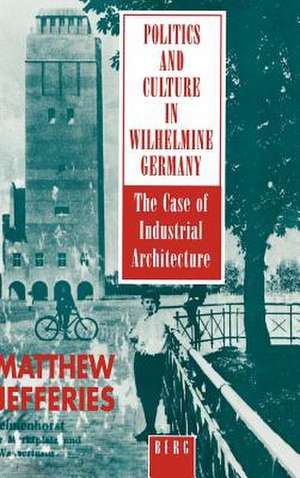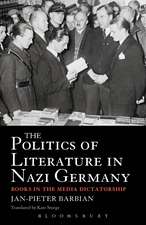Politics and Culture in Wilhelmine Germany: The Case of Industrial Architecture
Autor Matthew Jefferiesen Limba Engleză Hardback – 31 iul 1995
Preț: 774.12 lei
Preț vechi: 900.14 lei
-14% Nou
Puncte Express: 1161
Preț estimativ în valută:
148.12€ • 155.07$ • 122.57£
148.12€ • 155.07$ • 122.57£
Carte tipărită la comandă
Livrare economică 07-21 aprilie
Preluare comenzi: 021 569.72.76
Specificații
ISBN-13: 9780854969456
ISBN-10: 0854969454
Pagini: 284
Ilustrații: 48 photographs
Dimensiuni: 138 x 216 x 20 mm
Greutate: 0.54 kg
Ediția:First.
Editura: Bloomsbury Publishing
Colecția Berg Publishers
Locul publicării:London, United Kingdom
ISBN-10: 0854969454
Pagini: 284
Ilustrații: 48 photographs
Dimensiuni: 138 x 216 x 20 mm
Greutate: 0.54 kg
Ediția:First.
Editura: Bloomsbury Publishing
Colecția Berg Publishers
Locul publicării:London, United Kingdom
Notă biografică
Matthew Jefferies Lecturer in German History,University of Manchester
Recenzii
'Sheds considerable light on the character of the Wilhelmine bourgeoisie and its relationship to the economic, social, political and cultural features of Germany's 'modernization' in the early years of the 20th century.'Joan Campbell, Department of History, University of Toronto'Architectural history set in an economic and social framework is all too rare: the present work is to be doubly welcomed, for it is also both knowledgeable and sensitive, and it makes fascinating reading.[...]The study casts a welcome light on the 'other' Germany, cultured, humane, progressive, which is too often overlaid by the coarse Prussian militarism of that age.'Business History'Jeffries's book is a significant contribution to our understanding of the complex intersection of art, industry and German cultural reform. His thorough and interdisciplinary research will make his study useful to scholars interested in architecture, bourgeois reform industrial relations, and economic structural ch













